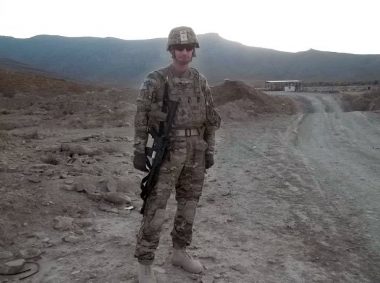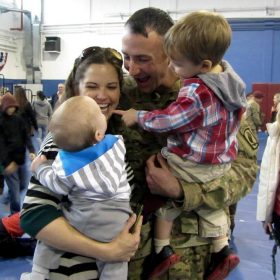U.S. Army Maj. John Kirchgessner ’02 shares his perspective on the Gloal War on Terror and its aftermath.
 It has been more than 12 years since I graduated from Elon, and 10 since I shared my thoughts with The Magazine of Elon about my experiences after my second deployment to Iraq. I was a lieutenant in the U.S. Army when the story ran in the Winter 2005 edition, and anyone who read it may have sensed a tone of anger.
It has been more than 12 years since I graduated from Elon, and 10 since I shared my thoughts with The Magazine of Elon about my experiences after my second deployment to Iraq. I was a lieutenant in the U.S. Army when the story ran in the Winter 2005 edition, and anyone who read it may have sensed a tone of anger.
Having just returned from my second deployment, I was still new to the Army, and my perspective was very narrow. My job was to execute a counter-improvised explosive device mission without the appropriate training or resources. As a result, multiple IEDs hit my platoon and several soldiers were injured. I was also dealing with very personal issues after my first wife left me during my deployment. There I was, a kid barely out of college fighting the war in Iraq while my world at home was crumbling. Perhaps now that my emotions have subsided and time has passed, I can share my reflections more calmly. I have deployed two more times since 2004, once again to Iraq and also to Afghanistan. First-year students at Elon today would have been five years old on 9/11/2001. There is no reason for them to have any understanding as to why the United States is still a part of the Global War on Terror. The irony is that many who have been through it all, having fought to protect our nation’s freedom, may also have a difficult time articulating exactly why we are still involved with the war, and whether we have won or lost. At the risk of making an assessment that may be well beyond my pay grade, here is my opinion on the military effectiveness of the war.
Throughout history the most successful campaigns have been those that tied three levels of war together: tactical (controlled by division level and below), operational (controlled by combatant and corps-level commanders) and strategic (controlled by policymakers). The greatest problem over the past 13 years has been total disconnect from the strategic level to the tactical level. It is almost cliché to reference the time when President George W. Bush boarded the USS Abraham Lincoln and gave his “Mission Accomplished” speech in May 2003, but this epitomizes how strategists and policymakers had no idea what was going on in the tactical fight. As the war progressed, we began to see more mission statements that included the strategic objectives of enabling the Government Islamic Republic of Afghanistan, and there was greater emphasis placed on the partnership between Coalition and Afghan military and government. But by then it was too late. Our operational and tactical fight had been a counter-insurgency for nearly a decade, and yet we expected the same hardened warfighters from the previous 10 years to turn on a dime and transition to a security force advisor role. Meanwhile “green on blue” killings, in which the Afghan partners we are working with turn their weapons on us, have become commonplace.
A decade-long fight with no strategic objectives has created a sad state of affairs. There is no doubt in my mind that we have developed some of the most finely trained and equipped soldiers in the world. However, if asked to articulate the strategic purpose behind a tactical mission, most would not know or care what the answer was. I have come to a point in my career where I understand the need for a tactical plan that is nested with the strategic objectives. I accept it as my personal challenge to educate soldiers whenever possible to have greater understanding of their purpose and how their efforts are tied to the strategic objectives of our policymakers.
So was the war worth it? It depends. I consider it to be a strategic failure for I do not believe the world is markedly safer from terrorism now than it was 13 years ago, nor is the stability of the governments in Iraq or Afghanistan better today. However, the Saddam regime did fall, justice was brought to Osama Bin Laden, and there is more than one generation of American soldiers who have a greater cultural understanding than any others in the previous 60 years. I am proud of what I have done, honored to have served among heroes and grateful to all those who have made the ultimate sacrifice. In the end, I am a soldier and do not presume to know the value of a life. I do know that I would not change my decision to join or stay in the U.S. Army.
 Today I am a field grade officer in the rank of major, serving as the brigade executive officer with the 11th “Imperial” Air Defense Brigade at Fort Bliss in Texas. We are operating in the Pacific, Europe and the Middle East and continue to push out battalion-sized units year after year. These are missions that the Department of Defense has asked our unit to execute since 1991, and there is no end in sight. By virtue of our mission, we consistently serve in a strategic role and will likely continue to deploy long after most of the brigade combat teams have returned to their home stations. I will be returning to the Middle East next year; it will be another year away from my family, but another year that I hope to make a difference. Globalization is upon us, and we can attempt to share all cultures or remain divided to our own detriment and peril.
Today I am a field grade officer in the rank of major, serving as the brigade executive officer with the 11th “Imperial” Air Defense Brigade at Fort Bliss in Texas. We are operating in the Pacific, Europe and the Middle East and continue to push out battalion-sized units year after year. These are missions that the Department of Defense has asked our unit to execute since 1991, and there is no end in sight. By virtue of our mission, we consistently serve in a strategic role and will likely continue to deploy long after most of the brigade combat teams have returned to their home stations. I will be returning to the Middle East next year; it will be another year away from my family, but another year that I hope to make a difference. Globalization is upon us, and we can attempt to share all cultures or remain divided to our own detriment and peril.
U.S. Army Maj. John Kirchgessner graduated from Elon in 2002 with a degree in communications. He and his wife, Mandy, have two children, Cooper Jude, 3, and Ryne Cannon, 2.


